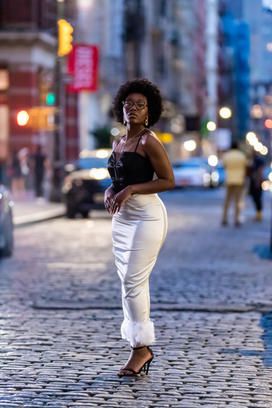Creator Q&A: Sara Howell ’20 on Medical School, Luxury Fashion, and Perpetual Joy
‘You can truly do anything; there’s no script to any of this,’ Howell says

You graduated last year. What have you learned, as a recent alumna?
Princeton does a great job of providing everything you need. Once you graduate, there’s much less structure, but that can mean more opportunity for you to designate your own path. This showed me the freedom to be my expansive, creative self: to do multiple things at once, like be a doctor and a fashion designer.
Your dual interests are in medicine and fashion. How are they intertwined?
I’ve wanted to be a doctor since I was 13. I was able to shadow a C-section with my mom, who’s a nurse. That made an impression on me!
Fashion came before medicine. In middle school, I would wear little kitten heels and advise my friends on their styles. When I started TigerTrends at Princeton, I realized I’m good at this, and could change the fashion industry in some way.
Fashion and medicine require two very different skill sets. But there is one connection: racial disparity in both. There are striking, preventable health disparities that I wish to address in medicine, such as Black mothers having a four-times-higher mortality rate during childbirth than their white counterparts. Though fashion is exclusive, the disparities within the industry can be addressed by introducing people of color into more commanding roles. As a Black woman going into two fields that are predominantly white, I’m an anomaly. But I can tackle both.
You’ve spoken about racial inequalities in medicine and equalizing care for people of color as a goal of your anesthesiology career. How have equality and inclusion shaped your founding of pAx?
There are privileges that come with power, and luxury conglomerates with teams nearly 100 percent white determine what’s in and what’s out. It’s not fair, because Europeans make up a small part of the population. There are five other continents — excluding Antarctica — full of people of color with distinctive cultures and backgrounds, who never get to see themselves represented on runways, in photo shoots, in creative design teams. People of color are becoming fashion’s majority mass consumers, and yet they’re being welcomed into an extremely limited environment.
pAx’s designs are global. For example, we have a bustier with cups designed with feathers — an ode to women-of-color communities in the Mayan civilization, in Hawaii, in Peru. Our entire team is women of color: We pay homage to cultures without stealing their customs. We try to combat prevailing stigmas, showing how the feminine form is beautiful without being sexualized.
Fashion is a little late to the game of inclusivity, but it’s going to get there, and pAx is going to be ready when it does.
You’re building a business while in medical school. How do you manage all of your responsibilities?
My mom had gotten me this book, called A New Earth [by Eckhart Tolle]. And it shifted my mindset. I realized that I had been thinking in this survivalist mindset: “What’s the next step? I have to do this, I have to do that. This is what success looks like, this is how I have to live my life.” And the book just completely turned that on its head. And now, my priorities are so different. I’m still goal-oriented, but the way in which I go about it is so much more sustainable. Now, it’s all about the people that I have in my life.
I surround myself with amazing people. I’m in a state of perpetual joy. I protect my peace; I see beauty around me every day. And, of course, God and I are very good friends. I’m blessed to be doing exactly what I want. Even if I’m not where I want to be just yet, I already have everything that I’m aspiring to. It’s just a matter of bringing it to fruition.
As a new graduate, what is your message to the Princeton community?
Alumni: Make sure you’re leaving the door open. Share the wealth — finances, advice, opportunities. Be accessible. Lift as you climb, because we all need each other.
Students: You have full authority to change the person you are. Don’t get caught up in who you are now, because you will change in order to achieve things you want to achieve.
You can truly do anything; there’s no script to any of this. Remember that the best things are very often on the other side of fear. Focus, manifest, put in the work, and keep going.
Interview conducted and condensed by Anna Allport ’23









No responses yet